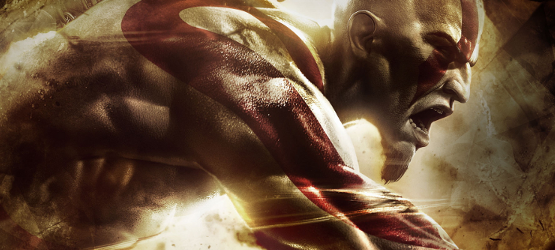The acclaimed God of War III that released on the PlayStation 3 was to be the end of Kratos, and the culmination of the franchise. But neither fans nor Sony Santa Monica were willing to let go of the tale of the Ghost of Sparta. With such a closing at the end of GOWIII, there was no place left to go but backward with God of War: Ascension, into the early days of Kratos for yet another prequel. However, Sony Santa Monica didn’t stop there, and instead ventured into an uncharted territory: multiplayer—a first for the franchise.
I, too, had my fears. Adding multiplayer to such a single-player focused series doesn’t always turn out well, and only detracts from what would have been an otherwise exceptional experience. But the Gods of Olympus have smiled upon this one.
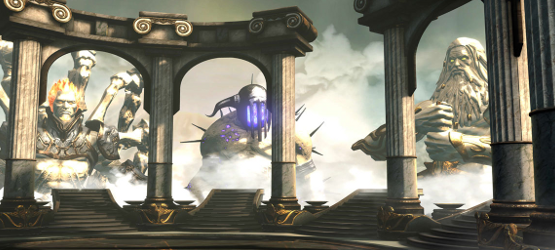
After a short tutorial and aligning myself with one of the four main Gods available in multiplayer—which, depending on whom you select, different attributes are boosted—my champion was ready for battle. I adorned him with armor, weapons, magic, items, and relics offering certain boosts and perks chosen from a massive armory of unlockables, giving plenty of reason to keep playing and earn XP to level and unlock new goodies. And even the smallest change to what sword you wield can have a dramatic effect on your warrior’s moveset and therefore performance.
The combat relies mostly on hacking and slashing, but to keep it fair, a blocking and parry system have been added. A successful parry leaves an opponent stunned and open to attacks. Even evading can put you or an opponent at risk to be grappled, factoring into a check and balance system applied to all the fighting. Stronger attacks have a cooldown period to avoid abuse, though, certain relics—attainable through treasure chests, leveling up, or completing certain “labors” or in-game tasks—can shorten this cooldown.
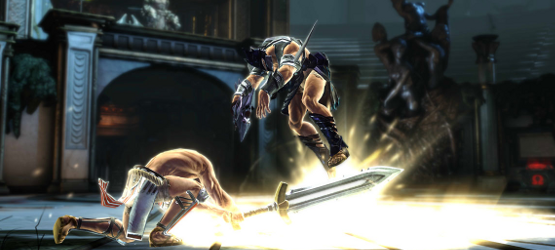
The sword (or hammer or spear) isn’t the only deadly weapon you might die by. Each area is riddled with traps to be set, such as spikes in the ground triggered by a lever, or controlling a Gorgon’s acid spray. Most areas, depending on the mode, are multi-tier, so climbing, jumping across large gaps, and grapple points leading to a higher plane are all commonplace, adding to the action and hunt.
Match of the Champions is essentially a free-for-all deathmatch between four to eight players in one tight arena, Colosseum-style, with the occasional Cerberus or other enemy showing up to stir the pot. Team Favor of the Gods puts four on four, or two on two on larger, sprawling maps to try and capture strategic points that earn the favor of the gods. There’s also Capture the Flag and, my favorite mode of all, Trial of the Gods, which puts two players together co-operatively against wave after wave of enemies to defeat within a time limit. Each kill adds more time to the clock; the more brutal the kill, the more time is added. Despite a worthy co-op partner, this mode proved to be too difficult to complete at first. Failing it still earns you XP and only fuels your desire to continue to level your character, unlock more weapons and armor to go back and face the challenge yet again.
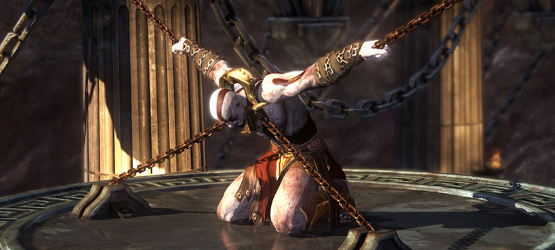
Instead of being just tacked on, multiplayer is strong enough to stand alone. If it weren’t for future multiplayer map packs being free, I could have even see it going the free-to-play route (like Uncharted 3 recently did) eventually due to the potential for longevity and power to draw players into the experience. Oddly, it shines brighter than the single-player campaign.
Single-player is a tough one to judge. It’s less of an epic tale than God of War III, and more of an adventure or journey akin to God of War or God of War 2. I can’t blame the developers for going this route, as it’s hard to replicate the same sensation felt when slaying nearly all of the major Titans and Gods of Olympus in just one game’s span. Especially, when the majority of significant figures from Greek mythology have already been explored, there was little left in the way of bosses, leaving what’s here unable to live up to the lofty expectations set forth from the previous PS3 entry in the series.
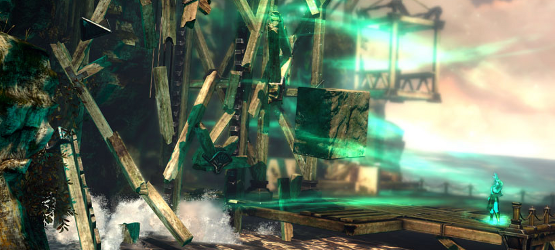
That’s not to say the campaign isn’t exceptional—it is—it’s just presented in an entirely different fashion. There is more focus on combat with regular enemies and sub-bosses like the Juggernaut or Cerberus, and there is much more climbing and platforming than ever before. Using the new Amulet of Uroborus (pictured above) to de- and re-construct destroyed architecture coupled with the body-double producing Oath Stone of Orkos provides ample opportunity for puzzles—more puzzles than ever, and some of the best to ever grace the franchise.
The new addition of World Weapons doesn’t quite have the effect on the combat as say, the Cestus did, but at least it’s something fresh to experiment with. Upgradable magic fits the alignment with the four Gods: Fire of Ares, Ice of Poseidon, Lighting of Zeus, and Soul of Hades—the same four Gods available in multiplayer. Each magic works with the Blades of Chaos, giving a different effect and set of special attacks. Initially I found these boring, but after some upgrading I could appreciate each one separately for its own powers and special abilities.

The campaign is also a lot longer—about 7-9 hours in total. The first few hours begin a bit on the dull side, but quickly explode into the God of War we’ve all come to love and expect once introduced to some of the more complex puzzles and you’ve upgraded your magic. However, the story itself does little to fill in any blanks left in Kratos’ tale, serving little purpose at all. There’s a new game+ mode after you finish the campaign the first time, allowing you to use artifacts found throughout the first playthrough to add certain perks to subsequent playthroughs. But since you can’t earn trophies in new game+ and Kratos is already fully upgraded and powerful, you’re better off replaying the game on harder difficulties using the regular old new game option.
In the end, single-player is still very much worth the price of admission even without multiplayer, if only for the combat and puzzles. Unfortunately, it is missing those incredible, memorable moments such as Kratos tearing Helios’ head clean off his shoulders, or yanking Hades soul from his still breathing body. God of War III left so little left unexplored, so few Mythological figures left unchallenged, so instead Sony Santa Monica broke new ground with a multiplayer offering that lives up to the franchise’s staple combat and brutality, while perfectly complimenting it.
-
Multiplayer gives Ascension longevity and freshness the series lacked.
-
Co-op Trial of the Gods is fantastic.
-
Combat is as strong and satisfying as ever.
-
Once upgraded, magic is fun to experiment with.
-
Puzzles are the best the series has seen.
-
Campaign length is 7-9 hours.
-
Lacking major memorable moments.
-
Starts off a little dull.
-
Story is uneventful and bosses lack excitement.
